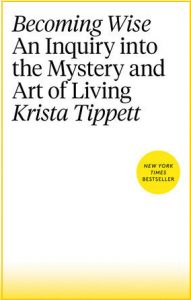 By Krista Tippett
By Krista Tippett
Reviewed by Shirley H. Showalter
Penguin Press, 2016, 304 pp.
How do human beings become wise?
Krista Tippett, radio host of On Being, has been exploring this question through a delicate process she first learned at the Collegeville Institute: “I walk with people back and forth across the intersection of what they know and who they are, what they believe and how they live—and what that might have to do with all the rest of us.”
For those who have shared in the Collegeville Institute’s common life and who have known founder Father Kilian McDonnell, whom Tippett credits with teaching her “the magic of rooting words about meaning in the color and complexity, the imperfect raw materials of life,” this book will take on layers of meaning unavailable to those who have not learned the art of conversation at Collegeville.
Perhaps, like me, you’ve listened to On Being on your local NPR station or by podcast for years. Perhaps you listen not only to the gracefully edited version of the program but also to the messier, more intimate, unedited versions. If so, you will love this book.
Perhaps you’ve never heard of the author or her program, but, like Solomon of old, you yearn to be wise. You too will find this book a refreshing stream in the desert.
 Krista Tippett knows the power of a good first sentence. She has commented on how arrested she was by John O’Donohue’s “It’s strange to be here.” Or Reinhold Niebuhr’s “Man is his own most vexing problem.
Krista Tippett knows the power of a good first sentence. She has commented on how arrested she was by John O’Donohue’s “It’s strange to be here.” Or Reinhold Niebuhr’s “Man is his own most vexing problem.
Her own first sentence reads, “I’m a person who listens for a living.” She begins with “I,” not with a more distant journalistic third person voice. The felicitous phrase “listens for a living” refers to far more than her job. It announces that she has a calling, one that involves living itself, and that she is seeking “voices not shouting to be heard.”
The search for wisdom can’t be separated from the search for self-awareness. The subject and the seeker are one in this case. Like both of Tippett’s other books, this one is an example of what Michelle Herman calls “stealth memoir.” It is “An Inquiry” as the subtitle states into “Mystery and the Art of Living.” It is also an inquiry into a process of understanding ideas in relationship to human beings who explore them and, at their best, embody them. The gerund “Becoming” (like “Being” in the title of the radio program) can’t be separated from Krista Tippett herself.
Pursuing wisdom in public over the course of the last twelve years could be an overwhelming and confusing experience. After interviewing hundreds of people, reading not only their books but digesting other interviews and videos in preparation for conversation, the author might be forgiven if she never stepped back long enough to look at the whole. And yet in this book, that is what she is doing. Looking back, how does she make sense of all of it? By choosing five themes: words, flesh, love, faith, and hope. Anyone with a passing knowledge of the Bible will hear echoes of the prologue to the Gospel of John (“The Word became flesh. . .”) and the famous “love chapter” I Corinthians 13. However, since these chapters are containers for people of many faiths and of no faith, these words describe no narrow orthodoxy but expand capaciously to fit all of the above.
Each chapter includes large sections of interviews excerpted from the online transcripts of On Being interviews. Again, this could feel cumbersome or repetitive to readers. What prevents that from happening, however, is the personal story of the author doing with her readers what she asks her subjects to do in radio interviews: reflect on how they themselves make meaning, starting with the very first question, “what was the spiritual or religious background of your childhood?”
For that reason, I love “stealth” memoir, the kind that doesn’t announce itself and is quiet.
I’m a lover of the memoir genre and quite aware of the accusations critics have made against it, narcissism leading the way. For that reason, I love “stealth” memoir, the kind that doesn’t announce itself and is quiet. The kind that includes both the author and the reader but provides what Parker Palmer would call a “third thing,” a subject much greater than either, a subject big enough to inspire the kind of humility, curiosity, and resilience that leads to wisdom.
The memoir sections inside this book illustrate one of the most profound truths about wisdom: it can’t be grasped. It’s never once and done. It can’t be extracted or abstracted indefinitely. Like the relationship between grandfather and granddaughter and father and daughter, it keeps moving, changing, and growing. And it ends with hope.
Like this post? Subscribe to have new posts sent to you by email the same day they are posted.



Leave a Reply